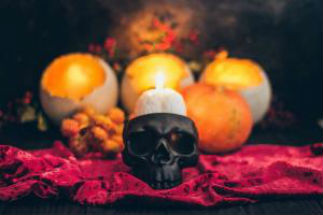
Number of Americans who say they are witches is on the rise
FREE Catholic Classes
The number of Americans who claim to be witches has increased dramatically over the past 30 years.

Highlights
Catholic Online (https://www.catholic.org)
10/29/2018 (7 years ago)
Published in U.S.
Keywords: Americans, witches, on the rise
Washington D.C., (CNA) - An estimated 1 to 1.5 million people say they practice Wicca or paganism, a rise from an estimated 8,000 Wiccans in 1990, and 340,000 in 2008.
In 2014, a Pew Research Center survey found about 0.4 percent of Americans identify themselves Pagan or Wiccan, a significant increase over prior years.
If accurate, the Pew data would suggest that there are more self-identified "witches" in the United States than members of some mainline Protestant denominations. For example, according to 2017 figures, there are 1.4 million practicing Presbyterians in the United States.
Wicca is a form of modern pagan witchcraft begun in the 1940s and 1950s in the United Kingdom. Those who practice Wicca often refer to themselves as "witches." People who practice other forms of witchcraft may not identify with the "Wiccan" or "pagan" label, meaning that the number of self-identified witches in the United States might actually be higher than reported.
Online, witchcraft has become increasingly popular and mainstream. The hashtag "#WitchesofInstagram" has been used nearly two million times on Instagram, featuring images of crystals, pentagrams, and people sharing their experiences as witches.
A priest pursuing doctoral studies in exorcisms told CNA that he was not surprised by the increasing number of Americans interested in dabbling in witchcraft.
The priest, who asked not be identified because of the attention exorcist priests often receive, pointed to the increasing popularity of spiritualism in general, which includes yoga and ouija, and the need for instant results in American culture.
He theorized that people who are dissatisfied with their religion begin to look for a "quick fix-- magic."
And while some witches differentiate between "white magic" and "black magic," with black magic being intentionally malicious, he rejected the idea there could be any such thing as positive or harmless magic.
"Both of them are associated with Satan, and he's in charge of that," the priest told CNA.
People who embrace one form of witchcraft, whether to find love or solve a problem may find themselves "trapped" in the world of the occult, he said.
"I have personally had many, many experiences of people coming to me," with issues that stemmed from something initially thought to be innocuous, he said.
The modern appeal of paganism may stem from Christianity's early roots, the priest said. When Christianity first spread to pagan areas--Ireland, France, etc.--the people who lived there were incredibly superstitious. Christianity was able to provide a sort of spiritual reassurance.
"Christianity always has good news, and the good news is that the devil is overcome," he said.
Now, he said, as people have begun to turn away from the message of Christ's lordship, and have begun to "glorify their own reason and understanding," Christianity has become less appealing--and people return to the superstitious practices of long ago.
A lack of faith in the Christian God coupled with the "very hedonistic society" of modern times adds to the appeal of the supposed quick fix of magic, he said.
"Anything we want, we have to have right away," he said.
"I mean, if I suffer, I need to have a solution. Even if you go to a hospital, you look at the chart and they always ask you 'how do you feel from one to 10?' and if you feel that your pain is too high, they will pump you with opioid painkillers."
These comments were echoed by Fr. Thomas Petri, O.P., vice president and academic dean at the Dominican House of Studies.
Petri told CNA that he did not find it surprising that some people who have turned away from Christianity would turn toward pagan worship.
"Man is essentially a religious animal who seeks meaning beyond the ordinary and so is prone to worship powers beyond himself," he explained.
The increase of self-identfied "witches" could also be as a result of Satan, he said, who "is actively at work in the world seeking to drive as many people away from salvation in Christ as he can." Satan, he said, does this "under the guise of principalities and powers that some people think are more novel and powerful than Christ."
"Sadly, they couldn't be more wrong and they need our prayers."
---
'Help Give every Student and Teacher FREE resources for a world-class Moral Catholic Education'
Copyright 2021 - Distributed by Catholic Online
Join the Movement
When you sign up below, you don't just join an email list - you're joining an entire movement for Free world class Catholic education.
Our Important Lenten Message - Please Watch
- Easter / Lent
- 5 Lenten Prayers
- Ash Wednesday
- 7 Morning Prayers
- Mysteries of the Rosary
- Litany of the Bl. Virgin Mary
- Popular Saints
- Popular Prayers
- Female Saints
- Saint Feast Days by Month
- Stations of the Cross
- St. Francis of Assisi
- St. Michael the Archangel
- The Apostles' Creed
- Unfailing Prayer to St. Anthony
- Pray the Rosary
![]()
Copyright 2026 Catholic Online. All materials contained on this site, whether written, audible or visual are the exclusive property of Catholic Online and are protected under U.S. and International copyright laws, © Copyright 2026 Catholic Online. Any unauthorized use, without prior written consent of Catholic Online is strictly forbidden and prohibited.
Catholic Online is a Project of Your Catholic Voice Foundation, a Not-for-Profit Corporation. Your Catholic Voice Foundation has been granted a recognition of tax exemption under Section 501(c)(3) of the Internal Revenue Code. Federal Tax Identification Number: 81-0596847. Your gift is tax-deductible as allowed by law.







